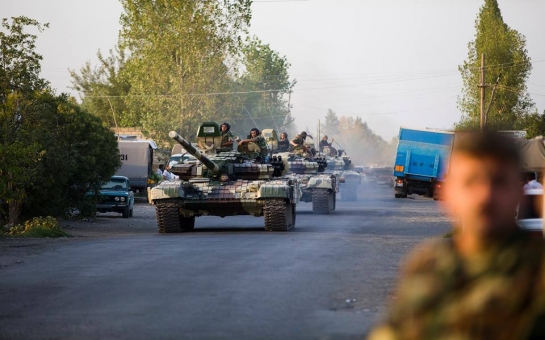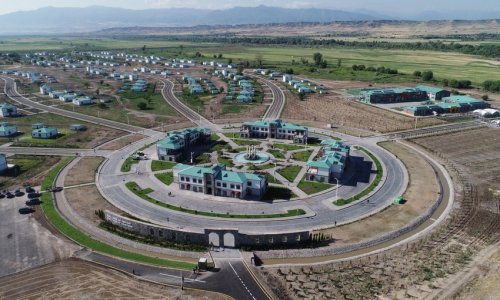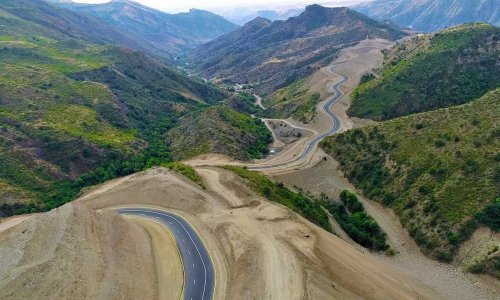By Krystof Chamonikolas
Optimism that Azerbaijan and Armenia will avoid war is luring investors back to their bonds as Russian President Vladimir Putin seeks to quell violence between the nations that sparked a record selloff.
The yield on Azerbaijan’s dollar notes due March 2024 fell 33 basis points in the past five days to 4.57 percent as the the heads of the two former Soviet republics met for talks in Sochi. Concern the nations’ worst clashes in two decades could escalate drove the rate up 54 basis points in the previous three days to the highest in nine months, data compiled by Bloomberg show.
Armenia’s six-year yield has slid 38 basis points since Aug. 5.
Putin, hit by sanctions because of the conflict in eastern Ukraine, hosted the talks between ally Armenia and Azerbaijan, backed by Turkey’s President-Elect Recep Tayyip Erdogan. The deadlock over Azerbaijan's rebel region of Nagorno-Karabakh is threatening a region where companies led by BP Plc have invested more than $40 billion to develop oil and gas fields in Azerbaijan while OAO Gazprom runs gas distribution in Armenia.
“Both sides have too much to lose, so the conflict should stay limited, without big economic losses,” Lutz Roehmeyer, a money manager overseeing $1.1 billion of assets including bonds from Armenia and Azeri banks at Landesbank Berlin Investment GmbH, said by phone yesterday. “The bonds sold off too much relative to the real risk of a full-scale war.”
The fighting between the two South Caucasus countries are threatening to ignite another conflict on Russia’s doorstep as the worst standoff with Europe and the U.S. since the Cold War intensifies over Ukraine. Putin is trying to rebuild his image after being accused of fueling the insurgency in eastern Ukraine, triggering a new round of sanctions on Russia.
Azerbaijan and Armenia signed a cease-fire brokered by Russia in 1994 after 30,000 people died and 1.2 million were displaced in a war over Nagorno-Karabakh. The two armies are dug into World War I-style trenches, engaging in regular skirmishes in the past two decades. The current escalation has killed 24 people since July 26, according to the Carnegie Endowment for International Peace in Washington.
The latest clashes have brought the nations closer to an open conflict, said Lawrence Sheets, a political analyst on the Caucasus based in neighboring Georgia and author of “Eight Pieces of Empire,” a 2012 memoir of the post-Soviet wars in the region.
“This is war,” he said in e-mailed comments on Aug. 10. “We are now only a step away from any of the sides deciding to resort to the use of highly destructive and sophisticated missile systems they have acquired, capable of causing massive casualties and destruction.”
The tension has left Eurobonds from Azerbaijan, Armenia and Georgia, which fought a war against Russia six years ago, among the worst performers this month out of 58 nations in the Bloomberg Dollar Emerging Market Sovereign Bond Index. The Armenian debt slumped 2.5 percent through Aug. 11, the most after a 3.9 percent loss on Ukrainian securities.
The selloff was overdone and created an opportunity for investors to “get involved again,” according to Sergey Dergachev, a money manager who helps oversee about $10 billion in emerging-market debt at Union Investment Privatfonds GmbH in Frankfurt. The fund last week raised its holdings of notes from the State Oil Co. of Azerbaijan, or Socar, as a “proxy” for Azeri sovereign debt, he said by phone yesterday.
The yield on Socar’s February 2017 dollar securities fell 59 basis points in the past four days from an 11-month high.
Azerbaijan has forged closer ties with Israel and NATO-member Turkey and increased defense spending 27-fold to $3.7 billion a year in the past decade, outlays that exceed Armenia’s annual budget. The third-largest ex-Soviet oil producer, which signed a $45 billion contract in December with a BP-led group to pipe gas to Europe, has repeatedly threatened to use force to regain control of Nagorno-Karabakh should peace efforts fail.
Armenians took over Nagorno-Karabakh, a mountainous enclave about the size of Rhode Island, and seven adjacent districts from Azerbaijan in a war after the Soviet Union’s collapse in 1991. Four United Nations Security Council resolutions were passed demanding an Armenian withdrawal from Azeri territory adjoining Nagorno-Karabakh. About 700,000 Azeris were forced to leave the districts, 200,000 Azeris left Armenia and more than 360,000 Armenians fled Azerbaijan.
Armenia hosts a Russian military base in its second-biggest town of Gyumri, near the Turkish border, and Russian troops guard Armenia’s borders with Iran and Turkey.
“Neither Russia nor Turkey are interested in a military confrontation as this would involve a lot of headaches for both countries,” said Union Privatfonds’ Dergachev. “I do expect Putin and Erdogan to try to broker a cease-fire.”
(Bloomberg)
Bakudaily.Az











